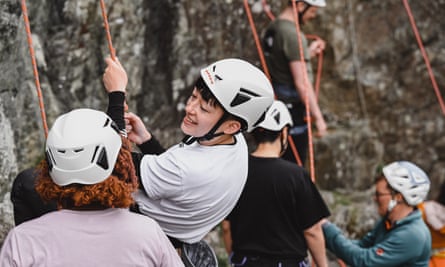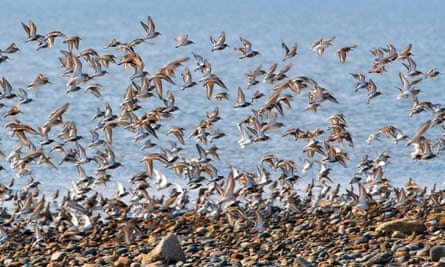It happened at an indoor wall for the sport of “bouldering”. I was standing watching some athletic young men conquer a tricky route that was beyond my abilities, half-listening to their banter, when I suddenly understood what they were discussing. A proposal to climb outdoors. They had never done it. They dreamed of it, but were uncertain how to go about it.
It’s not only rock-climbing that has this issue. Throughout the UK, there is fresh, unused kit sitting under beds, in lofts and in garden sheds, a testament to thwarted dreams. I am guilty myself. The fishing kayak that has never been wet hangs from the shed roof where I winched it on ratchet straps. I was apprehensive about using that impulsive lockdown purchase.

It is not the first time I have had that life lesson. Long ago, on a family trip to the Lake District, aged nine, I saw some men rock-climbing. I pinched the washing line from the caravan site and sneaked off to do it too. Halfway up a crag in Langdale, I was confronted by a burly chap wearing a red helmet. “What the bloody ’ell are you doing ’ere?” I was escorted along a ledge and told to clear off.
Now, more than half a century later, I am sitting beneath Stickle Barn crag, not a mile from where that incident occurred, ruminating on the nature of access and opportunity. Things have changed a bit. We are allowed to walk in areas once kept for a privileged few. Equipment, tuition and information are easier to come by. “The UK is lucky to have amazingly good climbing guidebooks – really useful if you’re just starting out,” says Alan James, chief executive at Rockfax, who recently started an app that gives comprehensive information on all UK climbing routes. On top of this, attitudes have shifted and outdoor types have become much more inclusive. But there are vast areas of potential outdoor fun cordoned off, either by real fences, or invisible ones: expansive territories of MoD land, the still-unfinished English coastal path, lakes and rivers.

Here on the hillside we are breaking through all sorts of invisible fences. Our Italian climbing guide is checking the knots of someone from London’s Chinese community who has never climbed outdoors before. “I’ve climbed on every wall in London,” says Yichen, grinning with excitement. “This is so different. I can’t believe how steep the walk up here was.”
“A lot of people I know would never dare come here,” says Amal from Wanderers of Colour, a community group who encourage people of colour to participate in activities that they might shy away from. “It can be a bit intimidating.”
Other potential barriers exist. Climbing, like other sports, can appear jargon-ridden and exclusive. The desire to belong to a group can easily tip over into a need to exclude others. A small Lake District climbing festival, Arc’Teryx Climbing Academy, seeks to set all that aside. Everyone here, from professional climbers and guides, through all levels of ability to novices, are here to enjoy the rock – and the convivial atmosphere afterwards with barbecues, films and talks. Welsh climbing specialists DMM lend everyone helmets and harnesses and each morning for three days, I gather with a small group on a particular course (everything from outdoor bouldering for beginners to advanced multi-pitch lead climbing). We debate what kit we will need and what each of us has already. When we head out, we are already like a gang of mates heading for the rock, exactly what we all want.

The writer attended the annual Lake District Arc’Teryx Climbing Academy. Events and workshops vary, but half-day courses cost about £45. An Alpine academy is held in Chamonix with courses from £50 upwards (mountaineering starts at £100 for a full day). Equipment can be borrowed.
Other outdoor activities to try
Kayaking
The Plas y Brenin centre in north Wales is the go-to spot for aspiring whitewater paddlers and more experienced kayakers. It runs a festival for women, ShePaddles Cymru, for all abilities and and residential summer camps. Women are also specifically catered for by the Women’s Sea Kayak festival in Cornwall. If you prefer your kayak without a deck, that’s to say, a canoe, then try canoeing above the ground. Canoefest is held in different locations each year, one of which is close to Thomas Telford’s Pontcysyllte Aqueduct, high above the River Dee, on the Llangollen canal. A little farther afield the Open Canoe festival is held annually at Mirabel-et-Blacons on France’s Drôme River.
Hiking
If your parents and community never hiked and had no idea that national parks existed, you are starting from a harder place than many, but public footpaths belong to everyone. The UK has plenty of walking festivals, and Europe also offers plenty for hikers. Walking is a perfect way to discover areas such as Umbria in Italy. And for wheelchair users there are events and information that can open up opportunities. The Dartmoor Walking festival creates walks for those requiring wheeled access.
Cycling
The unused bike features in many sheds, although reports show that members of ethnic minorities have low levels of bike ownership and high levels of aspiration to ride. Inspire yourself by visiting one of Britain’s festivals. Ard Rock is a mountain bike event, and there is also the Cycle Touring Festival, plus many city-based events such as Cambridge’s Festival of Cycling. If you want to pedal a bit further, try the Global Bike festival in Saalbach, Austria, well-known as a winter sports area.
Birdwatching

Despite the depredations of industry and intensive agriculture, Britain remains a premier birdwatching location, not least because the seasons bring constant change. East Yorkshire’s Spurn Migration festival is a good place to start as it attracts everyone from beginners to the world’s most experienced birdwatchers and allows you to spot massive numbers of species, some very rare. Also, check out RSPB events at the organisation’s reserves. The New York festival Black Birders Week made progress for diversity in this activity, something Flock Together, a birdwatching collective for people of colour that was formed in London is pursuing worldwide.
Stay connected with us on social media platform for instant update click here to join our Twitter, & Facebook
We are now on Telegram. Click here to join our channel (@TechiUpdate) and stay updated with the latest Technology headlines.
For all the latest Lifestyle News Click Here
